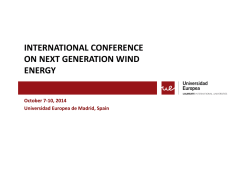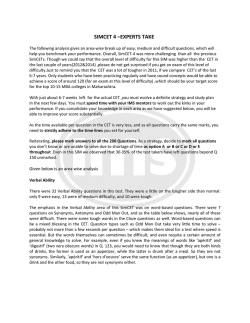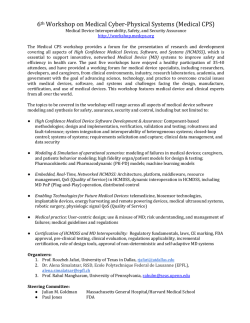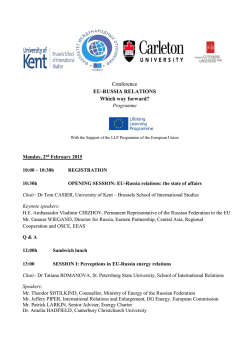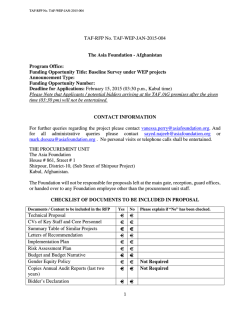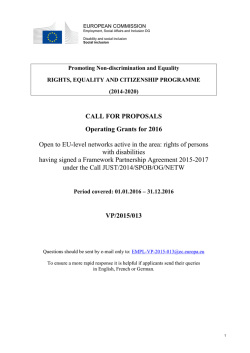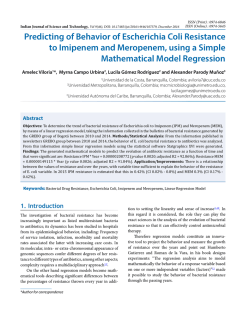
the pre-announcement - c
Funded by the European Union SEVENTH FRAMEWORK PROGRAMME KBBE.2013.1.4-02: Integrated Pest Management (IPM) - ERANET Coordination and Support Action C-IPM Coordinated Integrated Pest Management in Europe Grant agreement no.: 618110 PRE-ANNOUNCEMENT TRANSNATIONAL CALL 2015 Call for applications (pre-proposals) for transnational research in integrated pest management in Europe, launched by C-IPM This document is a preliminary text, therefore issues might change in the official announcement Co-funded by the European Union INTRODUCTION The present document is a pre-announcement of the joint transnational research call of the ERANET C-IPM, funded by C-IPM partners. WHAT IS C-IPM? Europe faces the challenge of responding to the mandatory implementation of the principles of integrated pest management (IPM) as called for by Directive 2009/128/EC on the sustainable use of pesticides. Most European countries are investing in research and extension to face this challenge, reduce reliance on pesticides, and reduce risks associated with their use. Added value and synergies can be created by coordinating such national research and extension efforts and by pooling existing resources. C-IPM accepts IPM as a continuously improving process in which innovative solutions are integrated and locally adapted as they emerge and contribute to reducing reliance on pesticides in agricultural systems and promoting sustainable agriculture. IPM is therefore a continuum, ranging from optimisation of pesticide use within ‘current’ crop protection systems, to substitution via the adoption of non-chemical strategies, and to a redesign of production systems obtained by acting for example on varieties, crop rotations and landscapes. Member States of the European Union are currently facing major difficulties in the area of crop protection in relation to the production of minor or speciality crops and more in particular with ‘minor uses’. This not only relates to fruit and vegetables crops, but also to tobacco, ornamental plants, herbs and spices as well as to tropical crops grown in overseas departments. The challenge of C-IPM here is to address the reduced pesticide availability both for the long and the short term with the combination and diversification of control methods, as well as extrapolation initiatives when not already undertaken by EPPO or the European task force on minor uses. In the future, farmers will no longer have access to the entire range of pesticides they use today, and will have to adopt IPM, incorporating alternative approaches or techniques to reduce their dependency on pesticide use. From January 2014 onwards, EU Member States are expected to implement the principles of IPM. This can only be achieved through a concerted effort to share existing knowledge and experience, as well as to develop alternative sustainable crop protection systems. C-IPM GOALS The overall goal of C-IPM is to ensure a higher level of implementation of IPM among European farmers by creating synergies from national investments in research and extension. The specific goals of C-IPM are focused towards: Identify synergies and gaps in existing national and transnational programmes and define an IPM-specific strategic research agenda and an implementation plan. Organise and fund joint transnational calls. Ensure better translation of national and European IPM-related programmes into applicable innovations. 1 Co-funded by the European Union BACKGROUND OF THE CALL The ERA-Net C-IPM consists of 32 partners from 21 countries. The first joint call for transnational research projects of C-IPM will be opened on the 27th April, 2015 (15:00h CET). This pre-announcement provides all the relevant information on the topics, projects eligibility criteria and submission procedure, timeline and contact details. Further information about forms and guidelines, eligibility and evaluation criteria, content on topics, budget and the list of the National Contact Points (NCPs) will be published with the launch of the call, simultaneously. Participant countries in this call are: France, Austria, Belgium (Flanders and Wallonia), Switzerland, Germany, Denmark, Estonia, Spain, Finland, Ireland, Lithuania, Netherlands, Norway, Poland and Turkey. CALL TOPICS This call includes the following three clusters and three topics, as following*: CLUSTER: (A) Preventive and sustainable (pest) management 1. Topic (A3) “Innovative and new pest monitoring tools and Decision Support Systems” (DSS). CLUSTER: (B) Alternative and innovative control. 2. Topic (B2) “Pests resistance management (the term pests includes: viruses, bacteria, phytoplasms, insects, artropods, fungi and weeds)”. CLUSTER: (C) IPM in Minor Crops. 3. Topics: (C2) “Flies in vegetables”, (C5) “Mites (spider, rusts and bud) in Berries and Small fruits” and (C8) “Soil borne pests and diseases (often polyphagous)”. *Detailed descriptions of topics will be given in the announcement. APPLICATION PROCEDURE The call will be officially published on the 27th April 2015, 15:00h CET. Proposals should be submitted via the Electronic Submission System (ESS), through the the special link created at the INIA´s website. The application will follow a two steps process: pre-proposals and full proposals. The submission of the pre-proposal is mandatory; it will not be possible to submit a full-proposal without having first submitted a pre-proposal. The applications have to meet and consider the following eligibility C-IPM criteria: 2 Co-funded by the European Union Submission of pre-proposals online through the ESS based in the Call Secretariat website: www.inia.es; The deadline for submission of pre-propsals is the 8th June 2015 , 15:00h CET; The language of the call and applications (PPs and FPs) is English; Project duration is maximum 3 years; The type of research is applied RTD ; The funding mechanism is Virtual Common Pot (VCP), what means that each funding body funds the selected researchers from their respective country ; There is non maximum limit of budget per project consotium ; The project consortium have to consist of researchers from at least 3 partner countries providing fund for the call. The number of partners in the consortium is not restricted ; Researchers from non-funding countries in the call are welcome to participate in project proposals, by their own contribution ; Private companies can participate in consortia depending on the national rules from their respective country where the legal entity is legally established (see National Regulations) ; More information on national rules and regulations for participation in the call, will be provided in the announcement of the call. TIMELINE Important events Date STEP 1 (Pre-proposals) Pre-announcement Launching the call - Submission of pre-proposals (PPs) Deadline for pre-proposals Eligibility check CG meeting for selection of PPs 31th March, 2015 27th April, 2015 (15:00h CET) 8th June, 2015 (15:00h CET) 22nd June, 2015 (15:00h CET) 26th June, 2015 STEP 2 (Full proposals) Full-proposals submission Closing date for submission of full proposals (FPs) Evaluation of FPs EEP meeting for evaluation CG meeting for selection of final projects Communication of final projects selected for funding Initiation of funded projects 15th July, 2015 (15:00h CET) 2nd October, 2015 (15:00h CET) 20th November, 2015 (15:00h CET) 30th November, 2015 First week of December, 2015 December, 2015 March, 2016 3 Co-funded by the European Union ELIGIBILITY AND EVALUATION PROCEDURES A) Eligibility of pre-proposals The eligibility of pre-proposals is made at 2 independent and decisive levels: 1. to meet the C-IPM requirements defined in the call (made by the Call Secretariat). 2. to meet their respective national requirements (made at National level). The pre-proposal will be assessed against: Relevance of the pre-proposal to the scientific scope of this call (adjustment to one or more topics selected for funding. Innovative approach. European added value of the partnership to IPM. Quality of the consortium. B) Evaluation of full proposals The evaluation of the full proposals will be performed by the Evaluation Expert Panel (EEP), taking into account the following requirements: Scientific and/or technical excellence/innovation Potential impact (knowledge, socio-economic,stakeholders) Management, budget and implementation of activities (dissemination) Capacity building, knowledge sharing, training and mobility CALL SECRETARIAT Spain: National Institute for the Agricultural and Food Research and Technology (INIA) Anabel de la Peña: Phone: +34 91 347 87 76 e-mail: [email protected] List of Acronyms: CS: Call Secretariat NCP: National Contact Point CG: Call Group (Funding organizations of this call) PP: Pre- proposals FP: Full proposals ESS: Electronic Submission System EEP: External Expert Panel 4
© Copyright 2026
